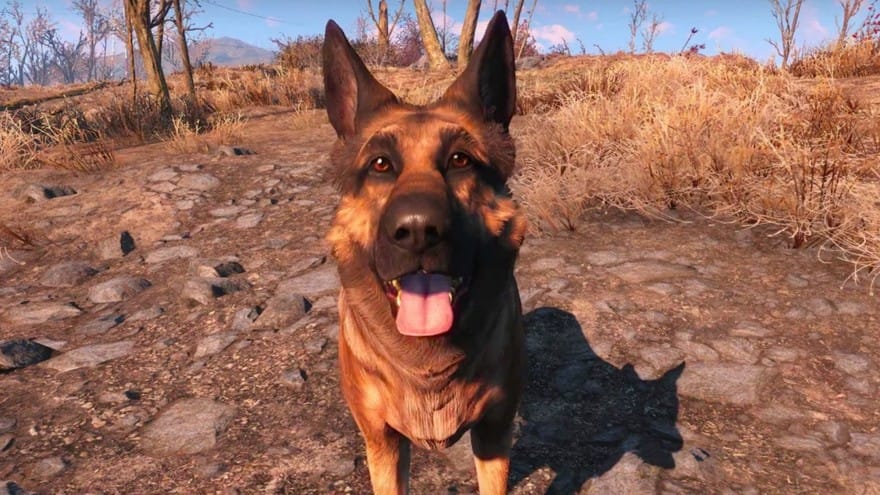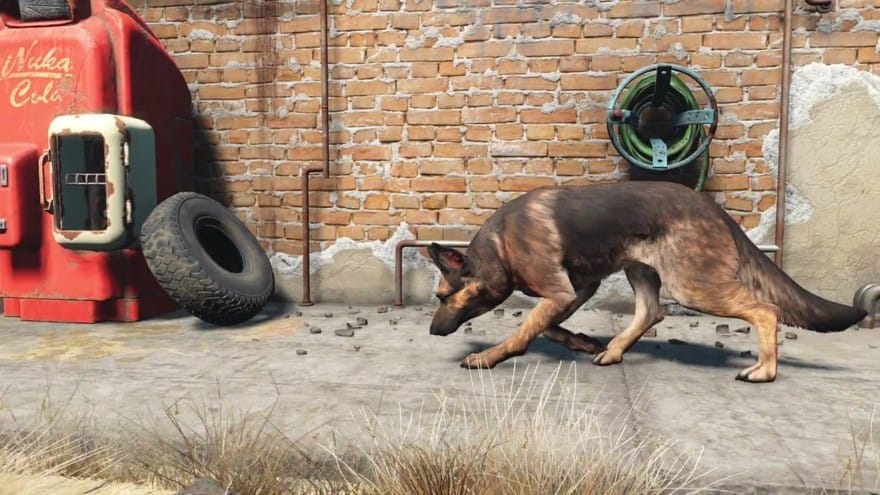Dogmeat, Fallout 4, and the Anxiety of Everything

To see more articles about princely German Shepherds, back our Kickstarter!
Dogmeat is a very good dog. It isn’t just that he’s obedient, though Dogmeat is definitely obedient. It isn’t just that he’s a handsome-looking German Shepherd, with wonderfully rendered, intelligent, and kind dog eyes. It isn’t even that he’s so quick to throw himself at any threat to the player character with a suicidal disregard for his own safety. No, Dogmeat is a very good dog because he’s Fallout 4’s rock. He’s stable. Dependable. In a game that constantly seeks to disorient the player with a seemingly never-ending lineup of distractions, Dogmeat is the lone presence that can be counted on.
///
I’ve spent a bit more than a dozen hours picking through Fallout 4’s post-apocalyptic Boston. In that time, my character has gone through some shit. He’s lost his family, awakened from cryogenic freezing centuries in the future. He’s murdered hundreds of people, been shot and bludgeoned to the precipice of death countless times, and is almost constantly sick with radiation poisoning. And, if the physical and emotional torment he’s endured wasn’t enough, my character has also trekked across huge swathes of a wasteland where everyone—and everything—calls out for his utmost attention.

A huge variety of mission objectives and activities isn’t new for a Bethesda-developed videogame. The studio’s titles are well known for featuring enormous worlds and a design ethos that emphasizes unhindered player freedom over strongly guided direction. Fallout 4, the team’s latest work, is no exception. It is, if anything, even larger in scope and looser with its restrictions. Though its opening hour is focused, neatly introducing its science-fiction world, primary characters, and plot hook, it casts aside these confines almost immediately. The player leaves their Vault, steps out into the wasteland, and begins pulling new mission objectives toward them with an almost gravitational force. Walk in a straight line from the starting area to Boston’s ruined downtown core, talk to a handful of characters along the way, and the quest tracker will fill up like a laundry list.
There’s nothing inherently wrong with this sort of glut—Fallout 4’s promise of player freedom would ring pretty hollow without there being things to actually do. The issue is when stress begins creeping into the experience, the player knowing that there are very likely many interesting characters to meet and self-contained plots to uncover around every corner of the game’s overstuffed world. My character moves through towns, wondering which buildings to enter and which streets to explore, with the same dread as someone sitting at home on a Friday night with an invitation to three different parties. There’s no way to choose. The only feasible approach to finding all of Fallout 4’s noteworthy moments is to strip away any sense of verisimilitude the living world offers by quite literally following the enormous mission list step-by-step. That, and searching out every centimeter of the landscape.
///
Dogmeat occasionally barks when he finds something worthwhile amongst the ever-present junk strewn around Fallout 4’s environments. He is a wasteland curator and, even though he can’t sniff out important story points, his very presence lends the impression that a path can be found through the enormity of the game. No matter what happens—no matter where hours of exploration take the wasteland wanderer—Dogmeat is there, ready to look for what matters.
Dogmeat is a very good dog because he’s Fallout 4’s rock
Most other videogame dogs don’t have this much responsibility. Call of Duty: Ghost’s Riley and Metal Gear Solid V’s D-Dog can be directed to rip out enemy throats. Grand Theft Auto V’s Chop does tricks and Mother 3’s Boney is a full-on member of the role-playing game’s party, with attacks and special abilities. But Dogmeat has to be much more than any of them. He has to keep the player grounded amongst the immensity of Fallout 4’s environments.
In practical terms, Dogmeat can guide the player to an enemy just out of sight or an ammunition box hidden in the wreckage of a ruined house. On the surface, he’s only another tool to be used in combat and exploration. But, in the larger context of Fallout 4, his ability to search out essential game elements from the world’s clutter is far more valuable. The game’s other companions not only lack this skill, they’re also complicated pieces of the apocalyptic fiction. They talk, have personalities that must be catered to, and their back stories tie into the missions the player takes on as they wander. Though they’re generally more useful in combat than Dogmeat, all of them are representations of more of the stuff that Fallout 4 is already bursting with.

Dogmeat, on the other hand, is silent—an affectionate and helpful reassurance who desires nothing more than to stick close to the player, cutting through the chaff by helping them survive and remaining perfectly, doggedly mute.
///
Games like Fallout 4—games with sprawling worlds, in which the player decides when, or if, to take part in specific story beats—differ from the directed narratives of media like film and books. Unlike the carefully selected sentences and exactingly shot scenes that form these narratives, an open world videogame is scattershot in its presentation. Because the player is given freedom to explore the environment in the order and manner they choose, the game’s director can’t ensure that they see everything of importance. Sticking to the main path—completing only the missions required to trigger the credits—requires a willful ignorance of the many optional objectives and areas that have been crafted by the game’s developers.
Dogmeat is there, ready to look for what matters
The only way to discover the entirety of what a title like Fallout 4 offers is to dissect it with obsessive, mathematical precision—to plumb its depths with the sort of scientific rigor that’s complete anathema to the liveliness that makes its digital world worth caring about in the first place. Otherwise, the player is left wondering what they’re missing. Bethesda, having made so much to see and do, is apparently indifferent as to whether or not their work is properly explored. They’ve shifted the burden of Fallout 4’s narrative success from their shoulders and onto the audience’s.
///
Having just completed another side mission, my player character stands outside the entrance to Diamond City—Fallout 4’s dystopian rendition of Fenway Park. The surrounding streets are cut off with piles of rubble, all potentially full of useful items. The nearby buildings hide characters who could trigger the next few hours of exploration. There are possibilities everywhere and it’s exhausting. Then there’s a bark and a wagging tail and, suddenly, some small clear path forward. He’s the simplest part of a game full of complication, but, Fallout 4 needs Dogmeat more than it knows.



